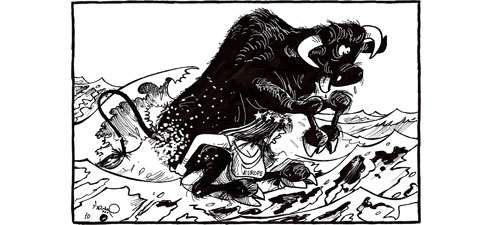Some time ago, in the light of the conclusions of the the European Council held this spring, it occurred to me that the emperor might just be naked. There was just no other way to account for the vast difference between what had been promised and such skimpy conservative results. From then on, I looked on in astonishment as European Union officials continued to voice a growing number of often contradictory statements that resulted in waves of market volatility.
Deploying his unique analytical ability and luminous intelligence and culture, my friend [the historian] José Medeiros Ferreira has compared the current juncture in Europe with the final years of the Austro-Hungarian Empire when power fell into the hands of a bureaucracy that was disconnected from reality. And he is absolutely right: the EU bureaucrats, who have done so much to drive a wedge between Europe’s citizens and the idea of Europe, are quite happy to look after their own interests without worrying about the status of the European project.
When I see the statements made by [the current ECB President] Jean-Claude Trichet — and I can only imagine that [his designated successor] Mario Draghi will be so blinded by his bid to show the Germans that he is even more Teutonic than the Teutons themselves that there will be no question of any deviation from what has become the official and unofficial position of the European Central Bank — that pave the way for the imposition of clearly unbearable austerity measures in Athens, at a time when the ECB has decided to forge ahead and raise interest rates in spite of the anemic growth in the eurozone and the crisis in peripheral countries, I have to ask myself: were we really right to believe that central banks should be independent?
The truth is that I am baffled by European political leaders insistence on a cure that will not only cause immense harm to the patients to whom it is administered, but also, at the end of the day, to themselves and the interests they are supposed to defend.
The Basic Laws of Human Stupidity
I have made enormous efforts in my attempt to understand the logic of this behaviour, and I admit that for some time, I generously assumed that European leaders had adopted a moral position, prompted by the legitimate desire to protect investors in sovereign bonds issued by the so-called ‘peripheral’ countries. But later, having remarked that these were investments, which, because they are supposed to imply a higher level of risk, benefit from a higher yield, I concluded that there was no moral argument that could possibly be leveled against a demand that the bond holders sacrifice a portion of their earnings if their investment is guaranteed.
Could it be, that in the absence of any moral reason, all of this was explained by policies that were wholly dictated by financial interests? But if this was the case, it hardly made any greater sense, because in insisting on drastic austerity packages that will further damage the finances of states in difficulty and impede them in their attempt to honour their commitments, European political leaders have embarked on a course of action that will damage those same financial interests.
And then I remembered Carlo Cipolla’s brilliant essay on The Basic Laws of Human Stupidity (Allegro ma non troppo pub. Critica 1992) which identified the third (and golden) basic law, which states: A stupid person is a person who causes losses to another person or to a group of persons while himself deriving no gain and even possibly incurring losses.
And that is when it occurred to me: if we transpose Cipolla’s analysis of individuals to institutions, can we say that the European Union is stupid? Unless this is a deliberate attempt to establish a complex scenario in which plan B is to expel the brown skinned members that have insidiously infiltrated the rich man’s club that is otherwise referred to as the eurozone. And this includes the Irish who have made scurrilous use of their pale complexions and light-coloured eyes to temporarily escape their historical role as the Blacks of Europe. Let’s not forget that these black sheep were also the ones who voted “no” in the referendum that was supposed to reinforce European integration?
Could it be that this is what Maria Damanaki wanted to say?*
* On 25 May, the European Commissioner for Fisheries and Maritime Affairs warned that her country would have to leave the eurozone if it was unable to make the necessary effort to reduce its enormous debt.
Was this article useful? If so we are delighted!
It is freely available because we believe that the right to free and independent information is essential for democracy. But this right is not guaranteed forever, and independence comes at a cost. We need your support in order to continue publishing independent, multilingual news for all Europeans.
Discover our subscription offers and their exclusive benefits and become a member of our community now!












